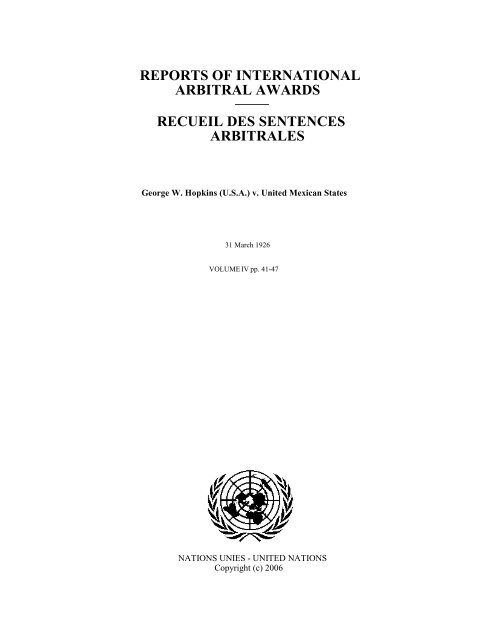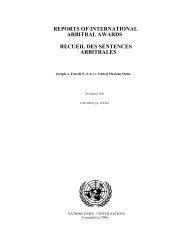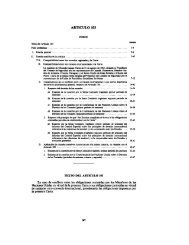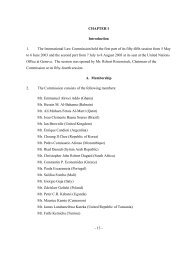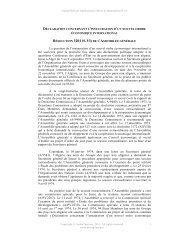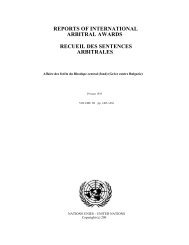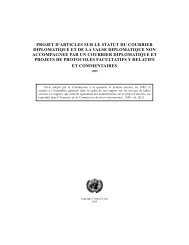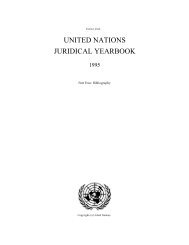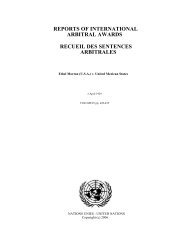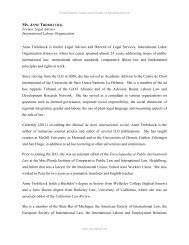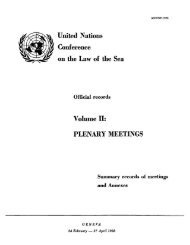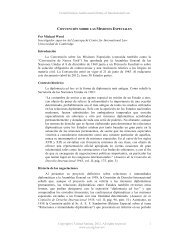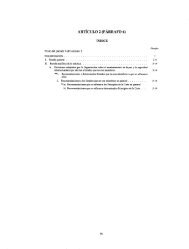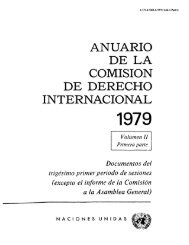George W. Hopkins (USA) v. United Mexican States - United Nations ...
George W. Hopkins (USA) v. United Mexican States - United Nations ...
George W. Hopkins (USA) v. United Mexican States - United Nations ...
You also want an ePaper? Increase the reach of your titles
YUMPU automatically turns print PDFs into web optimized ePapers that Google loves.
REPORTS OF INTERNATIONAL<br />
ARBITRAL AWARDS<br />
RECUEIL DES SENTENCES<br />
ARBITRALES<br />
<strong>George</strong> W. <strong>Hopkins</strong> (U.S.A.) v. <strong>United</strong> <strong>Mexican</strong> <strong>States</strong><br />
31 March 1926<br />
VOLUMEIV<br />
pp. 41-47<br />
NATIONS UNIES - UNITED NATIONS<br />
Copyright (c) 2006
MEXICO/U.S.A. (GENERAL CLAIMS COMMISSION) 41<br />
claimant Parker has sold and conveyed this claim to a <strong>Mexican</strong> corporation<br />
and hence it might be justified in making an award in favor of the <strong>United</strong><br />
<strong>States</strong> on behalf of the claimant, nevertheless the Commission is not satisfied<br />
with the evidence which has been presented to it on this issue, although the<br />
truth may be readily and definitely established.<br />
Interlocutory decision<br />
12. The Commission therefore decides the several questions presented in<br />
accordance with the foregoing opinion, but expressly reserves its decision<br />
with respect to the ownership of this claim and the amount thereof. The<br />
Agents are requested to cooperate in discovering the facts with respect to the<br />
ownership of this claim and the interest, if any, of the claimant Parker or the<br />
Compania Parker S. A. or others therein and file evidence herein on or<br />
before July 1, 1926, fully disclosing such ownership. The Commission suggests<br />
that this evidence may take the form of a stipulation of facts signed by both<br />
Agents. Should it appear that this claim is the property of the Compania<br />
Parker S. A. or other <strong>Mexican</strong> corporation in which the claimant Parker<br />
has a substantial and bonafide interest, an allotment by such corporation to<br />
the claimant Parker made in accordance with the Treaty provisions may be<br />
filed and will be considered by the Commission.<br />
GEORGE W. HOPKINS (U.S.A.) v. UNITED MEXICAN STATES.<br />
(March 31, 1926, Pages 42-51.)<br />
RESPONSIBILITY FOR ACTS OF DE FACTO GOVERNMENT.—EFFECT OF DECREES<br />
OF NULLITY.—NON-PAYMENT OF MONEY ORDERS. Respondent Government<br />
held responsible for non-payment of money orders of Huerta<br />
Government on ground they involved acts of an unpersonal character.<br />
Responsibility for acts of Huerta Government of a personal character<br />
will depend on whether at the time in question it had control over a<br />
major portion of the territory and a majority of the people of Mexico.<br />
Decrees of nullity subsequently issued by Carranza Government held<br />
not binding on the tribunal.<br />
NON-RECOGNITION BY CLAIMANT GOVERNMENT AS ESTOPPEL. Claimant<br />
Government held not estopped by its non-recognition of Huerta Government<br />
to present claim involving acts of such Government.<br />
PRIVILEGED STATUS OF ALIENS UNDER INTERNATIONAL LAW. The fact<br />
that a decision of the tribunal may result in extending to an alien a<br />
privilege not accorded <strong>Mexican</strong> nationals under <strong>Mexican</strong> law will<br />
not prevent the tribunal from reaching such decision, if it be dictated<br />
by international law.<br />
Cross-references: Am. J. Int. Law, Vol. 21, 1927, p. 161; Annual Digest,<br />
1925-1926, pp. 229, 232, 417; British Yearbook, Vol. 8, 1927, p. 180.
42 MEXICO/U.S.A. (GENERAL CLAIMS COMMISSION)<br />
Comments: Edwin M. Borchard, "Decisions of the Claims Commissions,<br />
<strong>United</strong> <strong>States</strong> and Mexico," Am. J. Int. Law, Vol. 20, 1926, p. 536 at<br />
541; G. Godfrey Phillips, "The Anglo-<strong>Mexican</strong> Special Claims Commission,"<br />
Law Q.. Rev., Vol. 49, 1933, p. 226 at 229.<br />
This case is before this Commission on the Mexica Agent's motion to<br />
dismiss.<br />
1. It is put forward by the <strong>United</strong> <strong>States</strong> of America on behalf of <strong>George</strong><br />
W. <strong>Hopkins</strong>, who was born and has ever remained an American national.<br />
The claim is based on six postal money orders aggregating 1,013.40 pesos<br />
alleged to have been purchased by the claimant from the <strong>Mexican</strong> Government<br />
at its postoffices of Mazatlân, Sinaloa, and Guaymas, Sonora, between<br />
April 27, 1914, and June 8, 1914, inclusive. It is alleged that all of these<br />
money orders were in due time presented to the <strong>Mexican</strong> authorities and<br />
payment was refused by them. The ground of the motion to dismiss is that<br />
these money orders were issued by the Huerta administration, which was<br />
illegal, that the acts of such administration did not bind Mexico, and that<br />
therefore these orders can not be made the basis of a claim before this Commission<br />
against the <strong>United</strong> <strong>Mexican</strong> <strong>States</strong>.<br />
Status of Huerta administration<br />
2. In considering the character and the status of the Huerta régime this<br />
international tribunal will look to the substance rather than its form, a<br />
substance which is not difficult to discover notwithstanding the flimsy garb<br />
of constitutional power under which it undertook to masquerade. There is<br />
no room to doubt but that the assumption of power by Huerta was pure<br />
usurpation. From being the military commander of the capital, charged<br />
with the protection of the administration of President Madero against the<br />
revolutionary activities of Generals Reyes and Diaz to overthrow it, Huerta<br />
went over to Madero's enemies (February 18, 1913); he declared himself<br />
provisional president while Madero lawfully was in power (February 18,<br />
1913, at 2 p. m. and 9 p. m.); he imprisoned both President Madero and<br />
Vice-President Pino Suarez and compelled them to tender their resignations<br />
(February 19,1913, about 8 a. m.) ; he forced the provisional acting president,<br />
Lascurain, to appoint him, Huerta, the ranking minister in office (February<br />
19, 1913, at 10 a. m.), and immediately thereafter forced him to resign<br />
(February 19, 1913, at 11 a. m.); he had his arbitrary acts confirmed by a<br />
congress from which his antagonists had fled and which could not muster a<br />
quorum (February 19, 1913, at 11.20 a. m.) ; and he contrived to procure<br />
recognition in some quarters as the constitutional provisional president<br />
through the suppression of press news so that the manner of his forcibly<br />
seizing the reins of government should not be known. The supreme court<br />
felicitated Huerta on his assuming office prior to the assassination of Madero<br />
and his associates and before the court could have known of the methods<br />
used to seize the office. The governors of the <strong>States</strong> which recognized Huerta<br />
were, most of them, either the partisans of Reyes and Diaz with whom Huerta<br />
conspired or had been placed in power by Huerta directly after the state<br />
stroke. It is not for an international tribunal to assume that events so<br />
abhorrent as these are only to be viewed from their "legal" aspect and that<br />
uncovering the real facts means an intrusion of "moral" or "sentimental"<br />
considerations on the sacred ground of law. Nor is there reason for alleging<br />
that in so judging the Commission infringes upon Mexico's sovereignty over
MEXICO/U.S.A. (GENERAL CLAIMS COMMISSION) 43<br />
its domestic affairs, for the <strong>Mexican</strong> Government itself, through its Agency,<br />
invites the Commission to do so.<br />
3. Before considering the question of the validity or nullity of acts done by<br />
or contracts entered into with a government administration of this character<br />
it is necessary to state at once the impossibility of treating alike all acts done<br />
by such an administra.tion or all transactions entered into by an individual<br />
with it. There seems to be a tendency both in jurisprudence and in literature<br />
to do so, to declare that all acts of a given administration, the legality of<br />
which is doubtful, must have been either valid or void. Facts and practice,<br />
however, point in a different direction.<br />
4. The greater part of governmental machinery in every modern country<br />
is not affected by changes in the higher administrative officers. The sale of<br />
postage stamps, the registration of letters, the acceptance of money orders<br />
and telegrams (where post and telegraph are government services), the sale<br />
of railroad tickets (where railroads are operated by the Government), the<br />
registration of births, deaths, and marriages, even many rulings by the police<br />
and the collection of several types of taxes, go on, and must go on, without<br />
being affected by new elections, government crises, dissolutions of parliament<br />
and even state strokes. A resident in Mexico who cleans the government<br />
bureaus or pays his school fee to I he administration does not and can not<br />
take into consideration the regularity or even legality of the present administration<br />
and the present congress; his business is not one with personal rulers,<br />
not one with a specific administration, but one with the Government itself<br />
in its unpersonal aspect.<br />
5. The difficulty of distinguishing between the Government itself and the<br />
administration of that Government arises at the point where the voluntary<br />
dealings and relations between the individual and the government agencies<br />
assume a personal character in support of the particular agencies administering<br />
the government for the time being. To this class belong voluntary<br />
undertakings to provide a revolutionary administration with money or arms<br />
or munitions and the like. But the ordinary agencies, departments, and<br />
bureaus of the Government must continue to function notwithstanding its<br />
principal administrative offices may be in the hands of usurpers, and in such<br />
a case the sale and delivery to these necessary and legitimate agencies of<br />
supplies, merchandise, and the like, to enable the Government itself in its<br />
unpersonal aspect to function is a very different transaction from one having<br />
for its object the support of an individual or group of individuals seeking to<br />
maintain themselves in office. The character of each transaction must be<br />
judged and determined by the facts of the particular case.<br />
6. A similar distinction arises in the field of international law. There are,<br />
on one side, agreements and understandings between one nation and another<br />
changing or even subverting its rulers, which are clothed with the character<br />
of a free choice, a preference, an approval, and which obviously undertake<br />
to bear the risks of such a choice. There are, on the other hand, many<br />
transactions to which this character is alien. Embassies, legations, and<br />
consulates of a nation in unrest will practically continue their work in behalf<br />
of the men who are in control of the capital, the treasury, and the foreign<br />
office—whatsoever the relation of these men to the country at large may be.<br />
Embassies, legations, and consulates of foreign nations in such capital will<br />
practically discharge their routine duties as theretofore, without implying<br />
thereby a preference in favor of any of the contesting groups or parties.<br />
International payments (for a postal union, etc.) will be received from such<br />
Government; delegates to an international conference will often be accepted
44 MEXICO/U.S.A. (GENERAL CLAIMS COMMISSION)<br />
from such Government. Between the two extremes here also there is a large<br />
doubtful zone, in which each case must be judged on its merits.<br />
7. Facts and practice, as related to the Huerta administration in Mexico,<br />
illustrate the necessity of a cleavage in determining the validity or nullity of<br />
its acts.<br />
8. In the field of international relations the distinction is apparent. Where<br />
pre-existing relations with government agencies continued under such circumstances<br />
as not to imply either approval or disapproval of the new administration<br />
or recognition of its authority these transactions must be treated as<br />
government transactions and binding on it as such rather than transactions<br />
had with a particular administration. The routine diplomatic and consular<br />
business of the nation continued to be transacted with the agencies assuming<br />
to act for the Government and which were in control of the foreign office, the<br />
treasury, and the embassies, legations, and consulates abroad. Even the<br />
<strong>United</strong> <strong>States</strong>, though placing its stamp of disapproval in the most unmistakable<br />
manner on the act of Huerta in usurping authority, kept its embassy in<br />
Mexico City open for the transaction of routine business, entrusting it to a<br />
chargé d'affaires, and maintained its consulates throughout Mexico. Such<br />
relations, so maintained, were entirely unpersonal; they constituted relations<br />
with the <strong>United</strong> <strong>Mexican</strong> <strong>States</strong>, with its Government as such, without<br />
respect to the status of the individual assuming to act for the Government.<br />
9. This distinction was recognized in the decisions made by the Carranza<br />
administration as to the legality of the acts of the Huerta administration.<br />
Such acts as the registration of births, deaths, and marriages were practically<br />
undisturbed, because they were performed in the orderly functioning of the<br />
Government quite independent of the recognition or nonrecognition of the<br />
individuals exercising authority. These were unpersonal acts of the Government<br />
itself as an abstract entity. It does not matter for the present argument,<br />
and it is not for the Commission to decide, whether the terms of the Carranza<br />
decree of July 11, 1916, are or not in all things to be commended; it is noticed<br />
here only to point out that it recognized the distinction between transactions<br />
with and by the Government itself and transactions with and by the Huerta<br />
administration.<br />
10. The same cleavage was recognized in connection with the financial<br />
transactions of the Huerta administration by later administrations of the<br />
Government of Mexico. The series of <strong>Mexican</strong> bonds issued during the<br />
Huerta régime, the proceeds of which were applied to the payment of the<br />
interest on the pre-existing debt of Mexico, have been uniformly recognized<br />
as valid, while other series of the same issue, the proceeds of which are claimed<br />
to have been applied to the maintenance in power of the Huerta administration<br />
or to the purchase of arms, munitions, and the like, have been repudiated.<br />
The Commission here expresses no opinion with respect to the application<br />
made by Mexico of the principle invoked in recognizing as valid one series<br />
of bonds and repudiating another series of the same issue. The latter is<br />
referred to here only to point out that the principle which the Commission<br />
applies in this case has been recognized and invoked by the Government of<br />
Mexico under administrations of unquestioned regularity and validity.<br />
11. It is clear that the sale by the <strong>Mexican</strong> Government to and the<br />
purchase by the claimant <strong>Hopkins</strong> of postal money orders falls within the<br />
category of purely government routine having no connection with or relation<br />
to the individuals administering the Government for the time being. The<br />
facts as developed in the Memorial and the briefs, which are not contested<br />
by the <strong>Mexican</strong> Agent, aptly illustrate the necessity of the distinction here
MEXICO/U.E.A. (GENERAL CLAIMS COMMISSION) 45<br />
made between acts of the Huerta administration in its personal character<br />
and acts of the Government itself in its unpersonal character. From the facts<br />
so developed it appears that at the very time these postal money orders were<br />
issued the greater part of the <strong>States</strong> of Sonora and Sinaloa, from which they<br />
issued, was dominated by Carranza as First Chief of the Constitutional<br />
Army, while the City of Mexico, on which the orders were drawn, was<br />
dominated by Huerta. Yet the post offices in these two <strong>States</strong> under the<br />
domination of Carranza continued to issue money orders of the <strong>United</strong><br />
<strong>Mexican</strong> <strong>States</strong> upon the postmaster in the Federal District of Mexico. In<br />
other cases that have been submitted to this Commission it is apparent that<br />
the government agencies functioning under the Huerta administration<br />
continued to carry out obligations under pre-existing contracts and otherwise<br />
functioned without reference to the change in the administration. It also<br />
appears that when Huerta seized the reins of government which in his<br />
capacity as provisional president he undertook to administer he did not<br />
change the government machinery as it had been set up under President<br />
Madero, which continued to operate in all its parts in the service of the<br />
people, and the great majority of the personnel of all of the bureaus and<br />
agencies of the Government remained unchanged and continued to discharge<br />
their duties to and in the name of Mexico. At no time did the government<br />
machinery cease to function, notwithstanding the change in the personnel of<br />
some members of its executive branch. To the extent that this machinery<br />
acted in the discharge of its usual and ordinary functions or to the extent<br />
that it received benefits from transactions of an unusual nature, Mexico is<br />
bound.<br />
12. But it by no means follows that if the contracts of the claimant <strong>Hopkins</strong>,<br />
evidenced by postal money orders, should be treated as contracts with<br />
the Huerta administration in its personal aspects Mexico is not bound by<br />
such contracts. The question then arises. How far can an administration<br />
which seizes the reins of government by force and is illegal in its inception<br />
bind the nation? It will be borne in mind that an administration of illegal<br />
origin either operates directly on the central authority by seizing, as Huerta<br />
did, the reins of the Government, displacing the regularly constituted<br />
authorities from their seats of power, forcibly occupying such seats, and<br />
extending its influence from the center throughout the nation; or it comes<br />
into being through attacking the existing order from without and step by<br />
step working toward the center. The acts of an organization of the latter<br />
type become binding on the nation as of the date territory comes under its<br />
domination and control conditioned upon is ultimate success. The binding<br />
force of such acts of the Huerta administration as partook of the personal<br />
character as contradistinguished from the Government itself will depend<br />
upon its real control and paramountcy at the time of the act over a major<br />
portion of the territory and a majority of the people of Mexico. As long as<br />
the Huerta régime was in fact the master in the administration of the affairs<br />
of the Government of Mexico its illegal origin did not defeat the binding<br />
force of its executive acts (award of 1901 in the Dreyfus case between France<br />
and Chile, Deschamps et Renault, Recueil international des traités du XX»<br />
siècle, an 1901, 394). Once it had lost this control, even though it had not<br />
been actually overthrown, it would not be more than one among two or more<br />
factions wrestling for power as between themselves. Even while still in possession<br />
of the capital and therefore dominating the foreign office, the treasury,<br />
and Mexico's representatives abroad, its acts of a personal nature could not<br />
ordinarily bind the nation from the moment it apparently was no longer the
46 MEXICO/U.S.A. (GENERAL CLAIMS COMMISSION)<br />
real master of the nation. It is unnecessary in this case for the Commission<br />
to determine the exact time between February, 1913, and July, 1914, the<br />
turning point was reached in the ebbing power of Huerta. During the months<br />
of February (last half), March, and April, 1913, Huerta's power was<br />
paramount in the north, the center, and the south of Mexico notwithstanding<br />
uprisings in several <strong>States</strong>. The Huerta administration was not accorded<br />
recognition by any foreign Government after June 1, 1913. During the period<br />
from January to July, 1914, inclusive, Huerta's power rapidly diminished,<br />
and it is not improbable that the alleged insult offered the American Flag in<br />
March, 1914, resulting in America's military occupation of Veracruz was<br />
an unsuccessful endeavor on his part to turn the tide in his favor by appealing<br />
to the <strong>Mexican</strong> people to rally to his support against a foreign "enemy" (?)<br />
It therefore follows that in every case submitted to this Commission in which<br />
acts of the Huerta administration in its personal aspect are involved the<br />
Commission must consider the particular facts in that case and decide upon<br />
the actual binding force upon the <strong>Mexican</strong> Nation of such acts.<br />
The Carranza decrees of nullity<br />
13. As the Commission holds that the contracts between the Government<br />
of Mexico and <strong>Hopkins</strong>, evidenced by the postal money orders which it<br />
issued to him, are unaffected by the character of the Huerta administration<br />
and are binding upon the <strong>United</strong> <strong>Mexican</strong> <strong>States</strong> as such, the question<br />
presents itself whether this binding force has from an international viewpoint<br />
been subsequently destroyed by the decrees issued by Carranza on February<br />
19, 1913, and July 11, 1916. The Commission has no hesitancy in answering<br />
both questions in the negative. The first decree, being that of one' State of the<br />
Union, Coahuila, could have no possible effect on or modify either the rights<br />
or duties of the Union itself. The second decree, even when considered as<br />
subsequently invested with the character of a law by the <strong>Mexican</strong> Congress,<br />
could not possibly operate unilaterally to destroy an existing right vested in<br />
a foreign citizen or foreign State or a pre-existing duty owing by Mexico to<br />
a foreign citizen or foreign State. The fact that it follows that foreign citizens<br />
may enjoy both rights and remedies against Mexico which its municipal laws<br />
withhold from its own citizens is immaterial as will be hereinafter pointed<br />
out in paragraph 16.<br />
14. From the foregoing the Commission concludes that <strong>Hopkins</strong>' contracts<br />
are unaffected by the legality or illegality of the Huerta administration as<br />
such, that they bind the Government of Mexico, that they have not been<br />
nullified by any decree issued by Carranza, and that they have not been and<br />
can not be nullified by any unilateral act of the Government of Mexico.<br />
Nonrecognition as an estoppel<br />
15. Has the American Government forfeited its right to espouse <strong>Hopkins</strong>'<br />
claim because in 1913 it warned its citizens against the "usurper" Huerta<br />
and never recognized his administration? The Commission holds that such<br />
warnings and such failure to recognize the Huerta administration cannot<br />
affect the vested rights of an American citizen or act as an estoppel of the<br />
right of the American Government to espouse the claim of such citizen before<br />
this Commission (see the award of Honorable William H. Taft, Sole Arbitrator<br />
between Great Britain and Costa Rica, October 18, 1923, reported<br />
in 18 (1924) American Journal of International Law, at pages 155-157).
MEXICO/U.S.A. (CENKRAL CLAIMS COMMISSION) 47<br />
The position assumed by the American Government under the administration<br />
of President Wilson was purely political and was binding, even on that<br />
administration, only so long as it was not modified. It was an executive<br />
policy, which, so long as it remained unmodified and unrevoked, would<br />
close to the American Government the avenue of diplomatic interposition<br />
and intervention with the Huerta administration. It temporarily, therefore,<br />
rendered this remedy—diplomatic interposition or intervention—unavailable<br />
to an American citizen but it did not affect a vested right of such citizen. But<br />
nonrecognition of the Huerta administration by the American Government<br />
under the Wilson administration was not dependent upon Huerta's paramountcy<br />
in Mexico. It meant that, even if it were paramount, it came into<br />
power through force by methods abhorrent to the standards of modern<br />
civilization, that it was not "elected by legal and constitutional means", and<br />
hence, while the Government of Mexico continued to exist and to function, its<br />
administration was not entitled to recognition.<br />
Privileged status of foreigners<br />
16. If it be urged that under the provisions of the Treaty of 1923<br />
as construed by this Commission the claimant <strong>Hopkins</strong> enjoys both rights<br />
and remedies against Mexico which it withholds from its own citizens under<br />
its municipal laws, the answer is that it not infrequently happens that under<br />
the rules of international law applied to controversies of an international<br />
aspect a nation is required to accord to aliens broader and more liberal<br />
treatment than it accords to its own citizens under its municipal laws. The<br />
reports of decisions made by arbitral tribunals long prior to the Treaty of<br />
1923 contain many such instances. There is no ground to object that this<br />
amounts to a discrimination by a nation against its own citizens in favor of<br />
aliens. It is not a question of discrimination, but a question of difference in<br />
their respective rights and remedies. The citizens of a nation may enjoy<br />
many rights which are withheld from aliens, and, conversely, under international<br />
law aliens may enjoy rights and remedies which the nation does<br />
not accord to its own citizens.<br />
Decision<br />
17. From the foregoing opinion it follows, and the Commission decides,<br />
that the allegations contained in the memorial filed herein bring this claim<br />
within the jurisdiction of this Commission. Assuming that such allegations<br />
are true, the Government of Mexico is bound to pay the claimant the postal<br />
money orders declared upon. The motion of the <strong>Mexican</strong> Agent to dismiss<br />
is therefore overruled. The running of time for filing the Answer has been<br />
suspended from December 16, 1925, to March 31, 1926.


